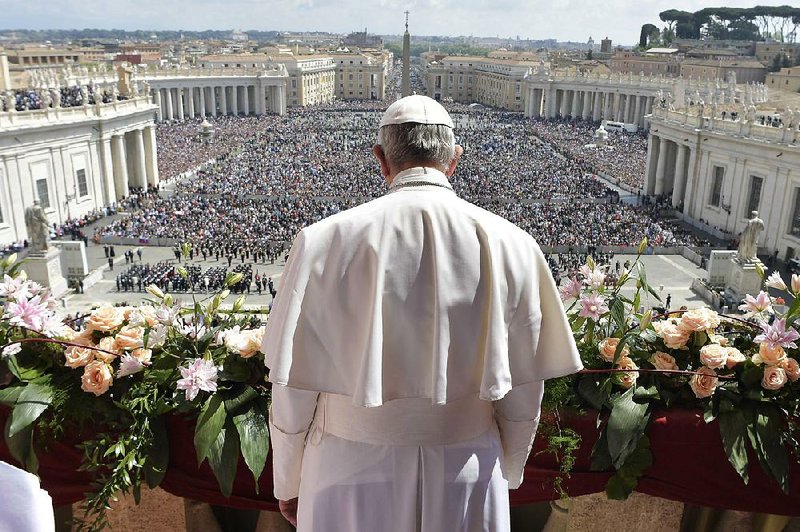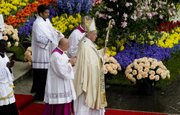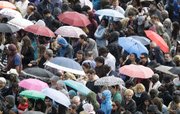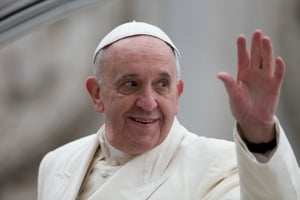VATICAN CITY -- On Christianity's most joyful day, Pope Francis lamented the horrors generated by war and hatred, delivering an Easter Sunday message that also decried the "latest vile attack" on civilians in Syria.
Both in his impromptu homily during Mass in St. Peter's Square and later, from the balcony of St. Peter's Basilica in his formal "Urbi et Orbi" Easter message -- "to the city and the world" -- Francis reflected on a litany of suffering, including wars, oppressive regimes, human trafficking, corruption, famine and domestic violence.
He encouraged people to hold fast in their "fearful hearts" to faith.
About 60,000 people, including throngs of pilgrims and tourists, endured tight anti-terrorism security checks -- and, later, a brief downpour -- to hear Francis and receive his blessing.
The crowd size, cited by the Vatican security forces, was smaller in comparison with some other Easters, when about 100,000 people turned out for the occasion.
After Mass, Francis toured the square in his open-topped, white popemobile and waved back to well-wishers.
Separately, in a letter he sent to the bishop of Assisi, Italy -- the birthplace of St. Francis, whose name he chose for his papacy -- the pope decried the "scandalous reality of a world still marked by the divide between the endless number of indigent" and the "tiny portion of those who possess the majority of riches and presume to decide the fates of humanity."
Traditionally, the pope gives no homily during the late-morning Easter Mass, saving his reflections for the "Urbi et Orbi" message at noon.
But Francis broke with that tradition, giving an off-the-cuff homily during Mass about what he described as a nagging question for many faithful: Why are there so many tragedies and wars if Jesus has risen from the dead, a belief that Christians celebrate each Easter?
"The church never ceases to say, faced with our defeats, our closed and fearful hearts, 'Stop, the Lord is risen.' But if the Lord is risen, how come these things happen?" Francis asked.
He said having faith gives sense in the middle of "so many calamities: the sense of looking beyond, the sense of saying, look, there isn't a wall, there's a horizon, there's life, there's joy."
He gestured toward the potted hyacinths, tulips and daffodils, which arrived from the Netherlands, and which were arranged in neat rows on the steps leading to the church.
Easter "isn't a party with lots of flowers. This is pretty, but it's not this, it's more than this," Francis said.
Celebrations elsewhere
Elsewhere, many of Iraq's Christians observed the holiday in camps for the displaced after fleeing the Islamic State extremist group and the ongoing operation to drive the militants from Mosul, the country's second-largest city. A number of Christian villages around Mosul have been retaken from the extremists since U.S.-backed Iraqi forces launched the operation in October, but few residents have returned.
Pakistan's tiny Christian minority celebrated Easter with high security after last year's celebrations were marred by a suicide bombing that killed more than 70 people.
The bomber had struck in a public park in Lahore that was packed with Christians as well as Muslims. The attack was claimed by a breakaway Taliban faction.
Pakistani security forces said Saturday that they had foiled a "major terror attack" against Christians when they killed a militant and detained another in Lahore hours after Christians marked Good Friday.
Zubaida Amanat, who lost her 21-year-old son in last year's bombing, said the violence had transformed what should have been a joyous holiday into an annual reminder of her grief.
"I just want this terrorism to end," she said. "All I can hope is that no other mothers go through the pain I did."
A service was also held in the West Bank city of Bethlehem, in the Church of the Nativity, the place where Christian tradition says Jesus was born.
In Jerusalem, thousands of worshippers flocked to the Church of the Holy Sepulchre, built on the site where Christians believe Jesus was crucified and resurrected.
This year, Easter was celebrated on the same day by both Roman Catholic and Eastern Orthodox worshippers. The denominations, which guard different sections of the Church of the Holy Sepulchre, held separate services one after another.
The Catholic and Protestant churches follow the Gregorian calendar, while Eastern Orthodox worshippers use the older Julian calendar, and the two Easters are often weeks apart.
Ecumenical Patriarch Bartholomew, who is the spiritual leader of the world's Orthodox Christian faithful, delivered a message of peace during a midnight service at the Patriarchate in Istanbul.
"Our faith is alive because it is based on the event of the resurrection of Christ," Bartholomew said.
In his official Easter message issued last week, Bartholomew urged strong faith in the face of the world's tribulations.
"This message -- of the victory of life over death, of the triumph of the joyful light of the [Easter] candle over the darkness of disorder and dissolution -- is announced to the whole world from the Ecumenical Patriarchate with the invitation to experience the unwaning light of the resurrection," his message said.
In predominantly Orthodox Romania, Patriarch Daniel urged Christians to bring joy to "orphans, the sick, the elderly, the poor ... and the lonely."
Late Saturday, Orthodox clerics transported the holy flame from Jerusalem by plane, and it was then flown to other churches around Romania. According to tradition, the flame appears each year at the Holy Sepulchre in Jerusalem and is taken to other Orthodox countries.
In Russia, where Orthodox Christianity is the dominant religion, President Vladimir Putin along with Prime Minister Dmitry Medvedev and his wife, Svetlana, attended midnight Mass at Moscow's Christ the Savior Cathedral.
In Serbia, the head of the Serbian Orthodox Church, Patriarch Irinej, held a liturgy in Belgrade's St. Sava Temple, which outgoing President Tomislav Nikolic attended.
Egypt's Coptic Christians, meanwhile, somberly marked Easter a week after two bombings by the Islamic State killed dozens of worshippers at churches in two separate cities.
Coptic Christian Pope Tawadros II presided over Easter Mass late Saturday at St. Mark's Cathedral in Cairo, with several government ministers in attendance.
Tawadros had earlier announced during his Good Friday sermon that, as mourning for the attack victims was ongoing, the celebratory aspects of Easter would be canceled this year, including the Easter morning reception.
A week before Easter, a suicide bomber was able to make his way to the front rows of a church in the Nile Delta City of Tanta before blowing himself up. In the Mediterranean city of Alexandria, another attacker detonated his suicide vest at the church gate's metal detector after being stopped by guards. The Islamic State extremist group claimed the bombings.
U.S. festivities
In the United States, New York's Fifth Avenue came alive on Easter Sunday with outlandish costumes mingling with elegant bonnets fit for St. Patrick's Cathedral and nearby churches.
The secular spectacle was a takeoff from a New York tradition from the 1800s, when the city's elite paraded their Sunday best to mark the holiday. New York's Easter parade is now an outdoor free-for-all of participants and spectators from around the world.
One faithful Christian mixed formality with pushing-the-envelope style: Cynthia Gable of Easton, Conn., attended Mass wearing a pink suit and a hat exploding with matching-colored feathers, while her husband, Scott Doerr, wore a black top hat.
"I think it's exciting," her demurely clad mother, Florence Gable, said of New York's annual rite.
Weeks were spent making costumes, with some even adorning their pets.
It took "Purely" Patricia Fox -- as the Manhattan woman calls herself -- 20 hours to fashion her bonnet.
"I sneezed and then it blew up into this amazing piece," she joked, describing the huge cascade of spring flowers flowing from her head to her shoulders.
The core religious event remained Mass at St. Patrick's with Cardinal Timothy Dolan as the celebrant. In a somber reminder of the turbulent times, he appeared outside the cathedral in white vestments, surrounded by black-clad members of the police anti-terrorism squad.
The prelate who leads New York's more than 2 million Roman Catholics said that on Easter, "We prayed specifically for those who literally risked their lives to worship this morning in certain parts of the world where there's persecution and attacks on people of all faiths."
Information for this article was contributed by Frances D'Emilio, Alison Mutler, Jovana Gec, Jim Heintz, Elena Becatoros, Verena Dobnik, Julie Walker and staff members of The Associated Press.
A Section on 04/17/2017



